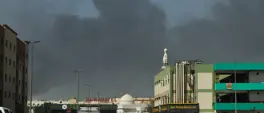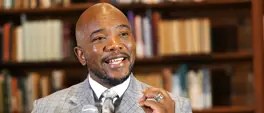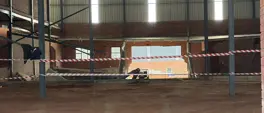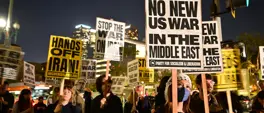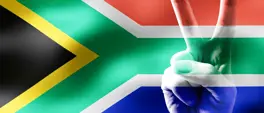JAMIL F. KHAN | The dangerous privilege behind claims that spatial apartheid no longer exists in Cape Town
Jamil F. Khan
27 October 2025 | 8:08"The mayor’s ability to make such a statement in the first place relies on a learnt blindness to the presence of Black and Coloured people, in the same way early colonialists could claim an empty land for the taking when arriving here."

Mayor Geordin Hill-Lewis photographed by Ruth Smith (Primedia +)
The mayor of Cape Town, Geordin Hill-Lewis, recently made a statement in which he dismissed spatial apartheid as “propaganda language that is no longer rooted in reality”.
During a subsequent radio interview he explained that he said this because “the City is working to dismantle the legacy of spatial separation”.
This statement is shocking, but not surprising coming from someone whose life has never been materially touched by the brutality of the apartheid system and in fact, continues to benefit from its legacy.
Even the choice to avoid the term apartheid in his explanation makes this spatial injustice a benign, almost organic occurrence that simply means that locations are separated by natural geography.
It is the age-old “that’s just the way it is” retort that absolves everyone of responsibility, unless we are willing to hold nature itself accountable.
Though this is certainly a problem with how willfully out of touch DA leadership is in the City of Cape Town, it is also a problem of the character of the city’s colonial legacy which remains embalmed under the stewardship of whiteness as a system and an attitude that determines that land to be one of the last remaining assets rightfully managed by white people, for white people.
The mayor’s ability to make such a statement in the first place relies on a learnt blindness to the presence of Black and Coloured people, in the same way early colonialists could claim an empty land for the taking when arriving here.
Since that first act of “taking”, white people have been trained through centuries of social conditioning to unsee the presence of African people, except when they are in service to them.
And even those roles of service require them to disappear from sight when the job is done.
This disappearance is written into the social contract of Cape Town’s arrangement of spatial apartheid, which requires workers to disappear by close of business, reminiscent of a somewhat law-abiding sundown town.
The mayor can say that spatial apartheid is no longer rooted in reality because his life and the lives of his peers have always had the benefit of a cut-off time after which their surroundings revert to being almost exclusively white.
The statement in question is not only ideologically dangerous but physically dangerous in a way he or his family will never experience. As noted in a joint open letter by Equal Education, Equal Education Law Centre and Ndifuna Ukwazi:
“Spatial apartheid lives on in every kilometre between a child’s home and their classroom. Families travel far because nearby schools are overcrowded, under-resourced, and underserved – not because these schools are inferior, but because the state continues to deny them the investment they deserve. In areas like Khayelitsha, Kraaifontein, and across the Cape Flats districts, learners face crumbling infrastructure, teacher shortages and low learning outcomes. These are not the failures of schools or educators, but the failures of government policy, funding and planning. Your remarks ignore this structural reality and suggest that the spatial barriers families face are no longer relevant when they remain central to educational exclusion.”
As a child, growing up in Kraaifontein, the Cape Town I would see on the postcards in gift shops, though known by my parents, was always a foreign place to me. When my family would visit the Atlantic Seaboard for a day at the beach, it was always clear to me that we, like the workers in the city, had a curfew by when to leave.
When I say I come from Cape Town it always feels somewhat dishonest, because outside of the familiarity of my community and those where people like me lived, Cape Town made it clear that we were being allowed in, for a limited time, but not to stay. Spatial apartheid, to those who experience it, has a feeling that one can sense on your skin.
The leering eyes boring holes of resentment into your back as you pass by while laughing too loudly. We say “to hell with them” and “this is our city” to shrug it off, but our dismissals hold little power in a city where a mayor, possibly one of those leering eyes at some point, says that our experiences don’t exist.
This denialism has connections to a more global political development too. In a time where apartheid and genocide are being outrightly denied or sidestepped here and abroad, this rhetoric, mostly led by DA members is appallingly dangerous.
To deny that apartheid and genocide is occurring in Palestine because you have not seen it first hand, is one thing, but to deny the effects of apartheid right here when we can see it, is another. The denialism and propaganda being disseminated by Israel has emboldened many who have been agitating for a collective amnesia to take root here.
From FW De Klerk refusing to admit that apartheid was a crime against humanity, to Helen Zille glorifying colonialism, white nostalgia for a range of successive periods all characterised by Black suffering is making another bid for legitimacy.
We must not be naive to think that these expressions of colonial nostalgia and denial are not connected to the right-wing ideologies resurging elsewhere that characterise calls for reparative justice as anti-white extremism.
At a time when Israel is paying millions of dollars to run propaganda campaigns denying their genocide against Palestininans, aided by the USA which is trying to erase its own colonial history, a mayor of Cape Town claiming that our own legacy of apartheid is propaganda is not coincidental.
The open letter signs off with:
“If you cannot see spatial apartheid, it is not because it has disappeared. It is because you refuse to look beyond the City Bowl. To deny it is to deny the daily experience of millions, just to comfort those who continue to benefit from inequality. It makes apartheid’s legacy seem distant and abstract when, in truth, it remains mapped across our streets, schools, and housing markets. Confronting and undoing this demands principled and honest leadership that is willing to name injustice for what it is, and to act decisively to reverse it. Spatial apartheid is not propaganda – but pretending it is not real is.”
The words of Geordin Hill-Lewis are not just untrue, they are dangerous, materially and ideologically, and there is no place in South Africa for this colonial thinking. Our leadership problems are many, but this is a problem of a specific kind that locates Europe’s tentacles firmly still in Africa.
Jamil F. Khan is an award-winning author, doctoral critical diversity scholar, and research fellow at the Johannesburg Institute for Advanced Study.
Get the whole picture 💡
Take a look at the topic timeline for all related articles.






